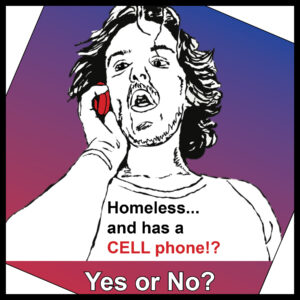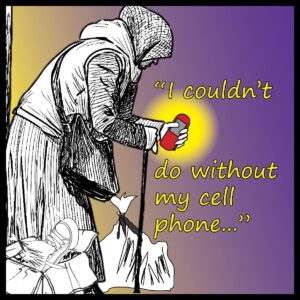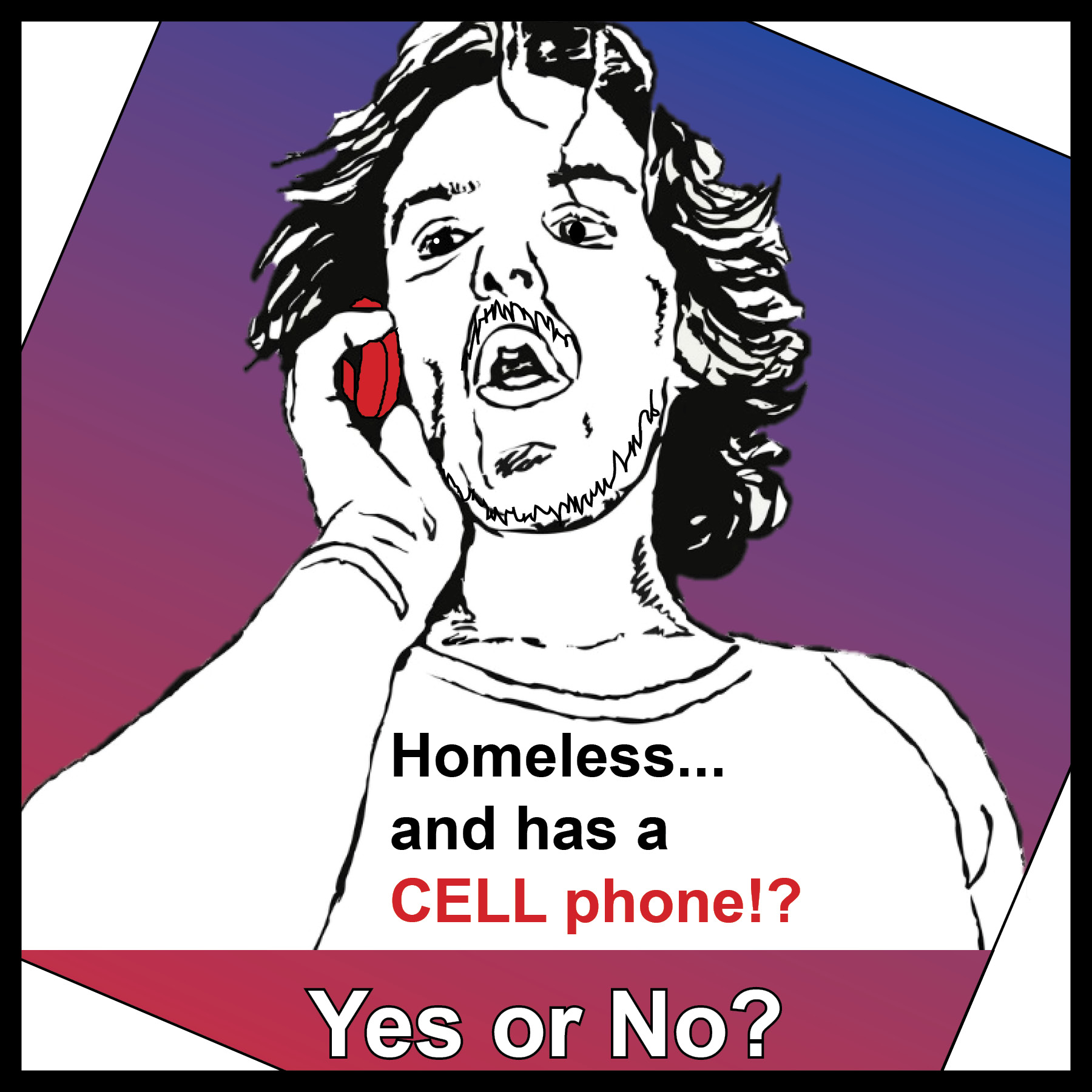By Jeremy Reynalds, Ph.D.
Founder and CEO
Joy Junction Inc.
 We all have them, and most of us are at one stage or another of addiction to them.
We all have them, and most of us are at one stage or another of addiction to them.
We see people walking along the street reading or tapping out messages to their digital world, and (sadly) still see people digitally engaged while driving.
I did see a curious sight the other day, though. While I am sure some of us have come at least close to being biffed by someone engrossed on their cell phone, I saw a guy the other day who was so engrossed in … really … a book that he nearly tripped over. It was surprising but refreshing! (Not that he almost tripped over, but was so involved in a book!)
But what about the homeless and cell phones? While it provokes less animus than it used to, some people are still concerned when they see the homeless with a cell phone.
I asked some of our Facebook friends what they thought, and while the consensus was overwhelmingly in favor of the homeless having a mobile device, there was definitely some concern for a few.
One woman said she had seen homeless people with iPhones, and “if you can afford an iPhone, you can afford food.”
That provoked a response from another person who said, “You don’t know if they had it before, or someone else paid is paying for it.”
However, that first person said, “If you have a phone that is far more expensive than mine I will not give you money. Ladies, has a panhandler ever told you they took cards? Yea, downtown Alb. I said, ‘I don’t have cash,’ to which the individual responded ‘I have PayPal.’ So yes, sometimes expensive cell phones can be a red flag … I think it is important for these people to have a means of contact with potential employers, family, and for emergencies, but not a new iPhone 5.”
Someone else said if the cell phone is used only for essential communication, then he is all for the homeless having one.
He added, “Just because they are homeless does not mean that they have any less rights than you or I.”
However, he was quick to qualify his statement. “Now with that being said. If I see a homeless person buried in their phone with their hand out on a corner, then we have a problem.”
He would have liked the answer from a couple of Joy Junction guests about their thoughts on cell phones.
When asked, this person wrote, “To me it’s only good for emergency calls, and not to be used in a meeting or in a class of any kind.”
Another guest was blunt and to the point, sadly writing, “A cell phone is not important to me. No one calls me and I don’t call them.”
This was echoed by a female guest who wrote that cell phones aren’t important to her. She said she never uses one and has no plans to change.
She continued, “I grew up without a phone and never saw the need for one. They make us distracted and detached with each other, and no one talks face to face anymore. If you need to get hold of me, come and find me.”
I wondered how some of our other Joy Junction guests felt about the need for a cell phone, and had one of our staff ask them. Here are some of their comments. 
One gut said that having a cell phone is important for him, as it keeps him in contact with potential work and family.
Another guy said that while a cell phone is important to help him land a job, “The best reason is in case I get a female’s number for a date.”
That one reminded me of the panhandling sign I’ve seen a few times around town reading something like, “Okay, I’ll be honest. I need money for beer.”
Another guy said that having a cell phone is important to him. “Because it can get me out of a jam, or if I have a car accident, am sick in the hospital and have to contact someone important like family, friends or my pastor.”
Someone else said having a cell is important for their children contacting them, setting up job interviews, making medical appointments and refilling prescriptions. (Yes, I just refilled a prescription over the phone).
Another woman said that her cell phone helps her keep all her medical appointments together.
She added, “It is also useful for reminders, and it makes it easy to stay in touch with loved ones back home. And it helps me document my thoughts, pictures and videos.”
Another guest called her cell phone a “lifeline.” She said, “I stay in contact with family, for emergencies such as for my child to reach me from school. I keep in contact with medical appointments, jobs, employment agencies and housing.”
Someone else said that her cell phone helps her go off Joy Junction property on her own without her husband “stressing out.”
Another person appreciated being able to receive pictures of her grand kids.
She added, “It also … allows me to access several versions of the Bible and concordance, books and for studying.”
Then there was a poignant thought from someone who hadn’t spoke to her father and her brother in five years.
The woman said, “If my father finally decides to make contact with me, I have my cell phone for that very important call. My children may decide they want to get in touch with me. That is the main reason for the annoying cell phone.”
Whole contacting family was important for this next person, she had some other reasons for having a cell phone.
“It helps me to keep time. I use it for an alarm, and keep events on the calendar. The Internet helps me to look up things I don’t understand, and it helps me to spell words because I don’t know how to spell or read well.”
Turning back to our Facebook friends, Ibu said that the homeless absolutely need a cell phone, both for job hunting and personal safety.”
She added, “The streets are dangerous, especially for those who rough sleep, and homeless people are more vulnerable not only to violence but also to illness. Being able to call for help in a timely manner can be the difference between life and death.”
Tammy said the homeless still have friends and family they need to keep in touch with.
She added, “Just because they hit hard times doesn’t mean they can’t have something that keeps them feeling grounded and feeling connected. Let’s understand these folk are still people. They need our compassion just like anyone else.”
Amerlia brought up a point said many times by our guests. Especially if you don’t have a vehicle, how else can you communicate to doctors and take care of other important business?
She added, “The way the world is, everyone needs to communicate.”
Robin reminded us that anyone who receives government assistance like Medicaid or food stamps qualifies for a free phone with a relatively small allotment of minutes.
She added, “Of course it’s okay to have a phone. We are all human, and communication is key in order to prosper.”
Gary had an interesting point, saying “ When I became homeless, the first thing I did was sell my guitar and buy the cheapest Android phone possible. I viewed it like going into battle; wanted to set up communications right away.”
Dana said that people who have often feel superior to those who have not, adding “Rent is a lot of money. A phone is not so much. It is not for anyone to pass judgment in any case.”
Sandra said a cell phone is someone’s way of communication and getting a job.
She added, “People who think it’s wrong haven’t a clue. If I was homeless, you better believe I would hustle to keep my phone on.”
Catrina sort of summed it up. She wrote, “A cell phone is now a necessity. Land lines are no longer the norm in a home, or a pay phone (necessarily) attached to a business. If this can give freedom to come out of a hole, then so be it.”
I agree that a cell phone is a necessity for the homeless. It helps them in all and more of the ways talked about in this article. With that in mind, the next time you see a homeless person with a cell phone, please don’t judge. Just be glad that they have the first tool necessary toward helping them get back on their feet.


